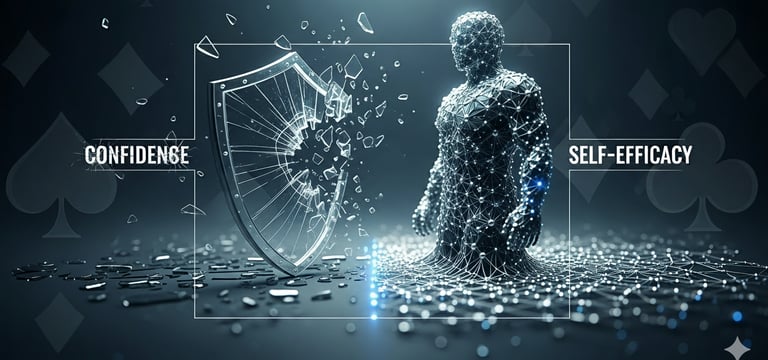WHY 'BULLETPROOF CONFIDENCE' IS A MYTH IN POKER
CONFIDENCEMENTAL FOUNDATIONS


At every level of poker, from home games to the high-roller circuit, players are chasing the same elusive goal: bulletproof confidence. It’s sold as a complete solution for tilt, doubt, and the pressure of a prolonged downswing. But what if this entire pursuit is not only unrealistic but counterproductive?
The idea of a permanent, unshakable feeling of confidence is a myth, especially in a high-variance environment like poker. The truth is that sustainable confidence isn't a prerequisite you bring to the table; it's the result of a well-executed process. Professionals understand this. They don't waste energy chasing an unreliable feeling. Instead, they systematically build something far more durable: Resilient Self-Efficacy.
This article will deconstruct the myth of bulletproof confidence and provide the professional's framework for building the real foundation of a strong mental game.
The Problem with 'Bulletproof Confidence'
The term "confidence" is often used in a vague, one-dimensional way, which prevents effective diagnosis and improvement. This leads to two fundamental issues that make it an unreliable foundation for a poker career.
"Bulletproof" and "Unshakeable": The Language of a Myth
Let’s start with the language we use. Terms like "bulletproof," "unshakeable," or "rock-solid" confidence are common in performance circles, but they create a flawed goal. This language suggests that confidence is a permanent, invincible shield you're supposed to acquire.
The problem is twofold. First, it sets an impossible standard. In a game defined by variance, no mental state is immune to pressure or bad beats. Second, it frames confidence as a fragile binary: either it’s "unshakeable," or it's broken. The moment a player experiences doubt—a completely normal state of uncertainty—they believe they have failed and that their "shield" has failed.
This misdirects a player's energy. Instead of focusing on building a resilient process that can function even with doubt, they get stuck chasing an unrealistic feeling of invincibility. It’s the very foundation of the myth we need to deconstruct.
The Conceptual Misunderstanding of Confidence
Many players fall into the "result vs. prerequisite" trap, believing they must feel confident to play well. This gets the dynamic backward. Genuine, lasting confidence emerges from diligent preparation and a solid decision-making process.
Furthermore, players often confuse fluctuating, situational self-confidence (the belief you can execute a specific play right now) with a stable, long-term belief in their overall abilities. When a few hands go wrong, this fragile mental state can falter because it was never anchored to anything solid in the first place.
The Central Challenge: Poker's Variance
Poker is a significant challenge to a stable mental game because it systematically breaks the brain’s natural feedback loop. In most areas of life, good decisions lead to good outcomes. At the table, the correct plays can be punished, and incorrect ones can be rewarded. This inherent variance systematically erodes a player's belief in their own judgment.
A common trap for players at all levels is anchoring their confidence to short-term results. This tendency can become particularly strong during a downswing, making a player's mental state a hostage to luck. The key professional discipline is to consciously decouple self-belief from immediate outcomes and, instead, anchor it firmly in the quality of the thought process.
The Professional's Alternative: Building Resilient Self-Efficacy
If chasing confidence is a flawed goal, what is the alternative? The answer lies in shifting the focus from a vague feeling to a precise, actionable skill.
Redefining the Goal: From a Vague Feeling to a Precise Skill
Professionals focus on building self-efficacy, which is defined as the belief in one's capability to execute a specific action in a specific situation. It isn’t a feeling you wish for; it’s a skill you build through deliberate practice.
This precision is its value. For example:
A player can have high self-efficacy for their pre-flop strategy but lower self-efficacy for navigating river decisions in multi-way pots.
This allows for a targeted, objective approach to improvement, moving you away from harsh self-judgment and toward identifying specific performance holdbacks.
The Four Pillars: A Systematic Framework for Building Self-Efficacy
Psychology provides a clear, evidence-based framework for building self-efficacy, centered on four key sources.
Mastery Experiences
This is the most effective source. It involves building a track record of success through deliberate practice and successful execution. Every time you study a specific spot, successfully apply a new strategy, or confirm your decision-making in a hand review, you are laying another brick in your foundation.
Vicarious Experience
You can also build efficacy by observing credible role models—like coaches or respected peers—successfully navigate situations where you struggle. This is more than just watching videos; it involves analyzing how they succeed to model their process.
Verbal Persuasion
This is about receiving realistic, constructive feedback from a trusted source (or through your own self-talk) that reinforces your belief in your capabilities. It requires shifting your internal dialogue from being emotional and results-based ("I'm so unlucky") to being instructional and process-based ("My read was correct, and I made the right fold").
Managing Physiological & Emotional States
A racing heart or nervous energy before a big session can be interpreted as fear, or it can be reframed as your body preparing for a high-performance moment. Learning to interpret these signals as readiness rather than anxiety is an important skill in maintaining efficacy under pressure.
Conclusion: Build Your Belief, Not Just a Feeling
The professional path requires a strategic mental shift: stop chasing the unreliable feeling of "confidence" and start the systematic work of building Resilient Self-Efficacy.
True mental strength in poker is not the absence of doubt. It is the ability to execute a high-quality process with conviction, hand after hand, because your belief is anchored in your skill and preparation, not in the outcome of recent outcomes.
Community Discussion: What is one specific poker skill you are working on to build your Mastery Experiences this week?
Personalized Application: Ready to put this into practice? Visit my website to see how my programs provide the structure to systematically build your self-efficacy.
"Sustainable confidence isn't a prerequisite you bring to the table; it's the result of a well-executed process"
"True mental strength in poker is not the absence of doubt. It is the ability to execute a high-quality process with conviction, because your belief is anchored in your skill and preparation, not in the outcome of recent outcomes."
